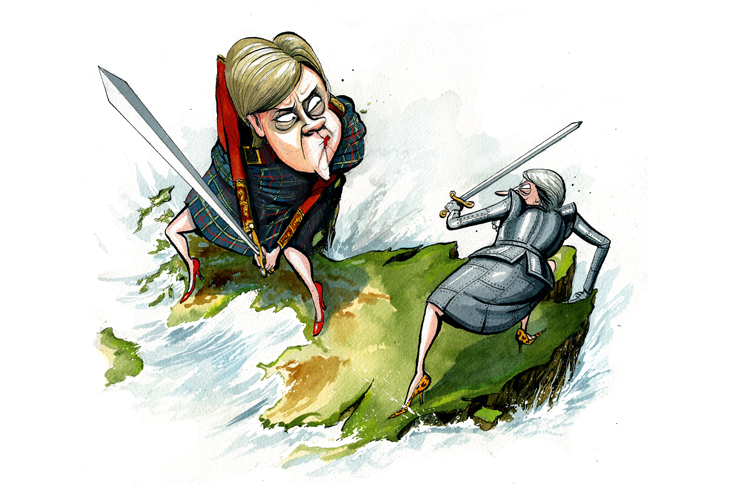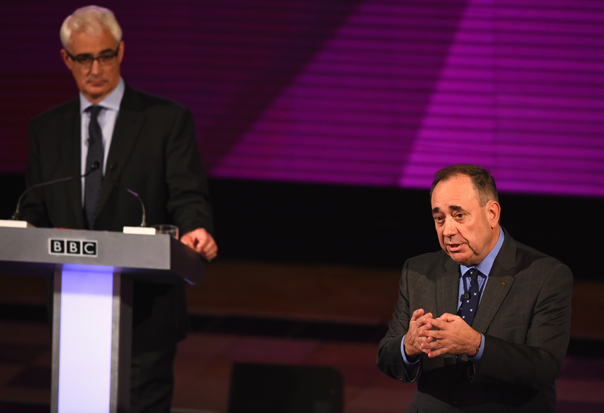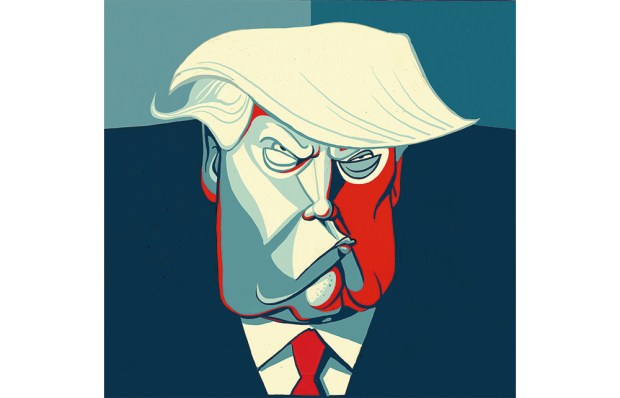On 24 June last year, in the Georgian splendour of her official residence in Edinburgh’s Charlotte Square, Scotland’s First Minister offered her reaction to Britain’s decision to leave the European Union. Since Scottish voters endorsed Remain, it was now, Nicola Sturgeon said, ‘highly likely’ there would be another referendum on Scottish independence. Since then that promise — one viewed with dread by the two million Scots who voted to preserve the Union in 2014 — has been variously ‘on the table’, ‘more likely’ than ever and even ‘all but inevitable’. The clock is ticking.
Later this month, Sturgeon will address her party’s annual conference. She is expected to outline the terms and conditions she seeks for another referendum. That begins with a demand that the UK government pass a Section 30 order granting the Scottish parliament the right to hold a second plebiscite. Having granted such an order in 2014, it will be difficult to refuse Ms Sturgeon’s demand for another.
Alex Massie and Fraser Nelson discuss the battle for Scotland:
If there is another referendum, Sturgeon says, the fault lies with a Conservative government in London that is ‘dragging’ Scotland kicking and screaming out of the European Union against its will — that Scotland is being bullied by its neighbour and must now make a choice for itself: independence or a Tory-dominated Brexit Britain.
Theresa May is likely to insist that no referendum is held before the UK has left the European Union. You can have your tea, she will tell Sturgeon, but only when I tell you. So not until 2019. This way, the Prime Minister hopes to avoid waging war on two fronts. Brexit is hard enough without the complication of another referendum to save the UK.
Nonetheless, Brexit really is a ‘material change of circumstance’. The SNP believes it necessitates another referendum just a few years after it lost the one which Sturgeon described as a ‘once-in-a-generation opportunity’ for Scottish independence. Like the pound, a generation isn’t worth what it was. But by insisting on no referendum until after Brexit is complete, the UK hopes to frame the choice as one between the continuity of Brexit Britain and an uncertain future outside — perhaps — the EU.
At first glance, conditions for independence seem unpromising. The Scottish economy is stagnant, growing at just a third of the speed of the whole UK. Oil revenues, once seen as the lubricant of a newly independent country, have collapsed. Scotland’s share of North Sea oil revenue amounted to £60 million in 2016, some 99 per cent below the £8 billion predicted by Alex Salmond less than three years ago. Above all, the Scottish government’s own figures admit that Scotland would begin its independent life with a deficit amounting to almost 10 per cent of GDP. On those terms, that would make it the worst economy not just in Europe, but in the developed world, and by some margin. The £9 billion fiscal transfer — or Union dividend — it currently enjoys would disappear. Separation would be eye-wateringly expensive.
So far, SNP hopes of a political dividend from Brexit have come to nothing. Three in five Scottish voters backed Remain, but this has not translated into greater support for independence. The polls are stubbornly resistant to change. They suggest that if a referendum were held this month, the result would be much the same as last time: 55 per cent of Scots would opt for the safety and security of the Union.
Many would do so grudgingly, but the risks and uncertainty would concentrate minds. Independence would guarantee tartan austerity of a kind not seen in decades. And for all that Brexit might be regrettable, abandoning the Union would be akin to reacting to the loss of a hand by cutting off a leg. Membership of the UK single market, after all, is worth four times as much to Scotland as membership of the EU single market. In these circumstances only a fool would endorse independence.
That is the prevailing view in Whitehall on the rare occasions when anyone diverts their attention away from Brexit and its consequences. It is a rational, comforting position. But it is also complacent. It risks repeating a mistake made the last time Scotland considered its constitutional position — the mistake of not taking independence seriously.
‘The case for the UK has to be made all the time,’ says one cabinet minister, implying that it is not made nearly often enough. Last month the cabinet devoted almost 90 minutes to talking about the Scottish problem, a discussion that would be unremarkable if it were not such a novelty.
Neither May nor Sturgeon would choose to make their stands on this kind of terrain. But politics has to be played with the cards you are dealt. For years, SNP orthodoxy has dictated that Scots will only embrace independence if Scotland is thriving. Now Sturgeon warns darkly of job losses and economic malfunction if Brexit goes ahead. The question is not ‘Can Scotland afford to be independent?’ but ‘Can Scotland afford not to be independent?’ Yes, independence will not be easy, but the greater risk is to remain part of a United Kingdom consumed by Brexit. Or, as Sturgeon put it recently, ‘The case for full self-government ultimately transcends the issues of Brexit, of oil, of national wealth and balance sheets and of passing political fads and trends.’ Nationalism is an existential question, not a utilitarian one.
So she is asking voters to ignore the numbers and vote, at least initially, for years of austerity. This is a high-risk enterprise, but opinion polls have confirmed that some economic arguments have less purchase than before. The economic warnings before the Brexit vote were equally virulent, yet made no impact. Ignoring the experts is a game that can be played on both sides of the border.
Mood matters, and the mood determines that the independence question be put once again. Perhaps, this time, for keeps. Sturgeon has walked her troops to the top of the hill. Bringing them down again may prove a nightmare. And if not after Brexit, then when? She knows she cannot count on retaining a pro-independence majority after the 2021 Holyrood elections, by which time the SNP will have been in power for 14 years. It need not be ‘now or never’, but there is a fierce urgency to now.
Sturgeon may not be in an ideal place to begin a march towards national liberation, but with Brexit, Trump and Le Pen riding a wave of populist and nationalist discontent, these are fertile times for opportunists. Besides, SNP strategists note that in 2014 they began the campaign with the support of only one in three voters; this time they’d start with something closer to one in two.
Meanwhile, Better Together is no more. No one expects a united unionist front for a second referendum. Scottish Labour, a shadow of its former self, is in no mood to ally with the Tories again. Nor does English Labour have much to offer the Union. By destroying Labour’s pretensions to government, Jeremy Corbyn has already boosted the independence cause. The prospect of Tory rule until 2030 will, the SNP believes, concentrate Scottish minds. Losing in 2015 would have been the best thing David Cameron could have done for unionism.
Meanwhile, Brexit complicates everything. The UK government insists it has no desire and sees no need for a hard border between Northern Ireland and the Irish Republic, apparently unaware that this will be seen as setting a precedent for the Anglo-Scottish frontier after independence. Unionism might need the threat of a hard border.
In 2014 the pro-Union campaign said only a No vote could ensure Scotland stayed in the EU — and look where we are now. Last time, the burden of proof lay heavily upon the nationalists; in a second referendum Britain will have to make an argument for its future too.
Some leading Conservatives now regret ‘The Vow’, the promise of more devolution made to Scotland in the final feverish days of the 2014 campaign. They consider it a panicked overreaction to a separatist threat that turned out to be weaker than it seemed. And the practicalities of further devolution, as interpreted by the Smith Commission and subsequent Scotland Bill, allowed the SNP to contrast the initial extravagant promises with the more timid, if still significant, reality. Once again, according to the nationalist narrative, Scotland was betrayed.
Alex Salmond is fond of quoting a letter John Steinbeck once wrote to Jackie Kennedy in which he corrected her view of Scotland. ‘You talked of Scotland as a lost cause and that is not true,’ he told her. ‘Scotland is an unwon cause.’ This is how almost half of Scotland still sees it. The SNP remains dominant, commanding the support of nearly 50 per cent of the voting population. Its membership is twice that of the other parties combined. And now, all across Scotland, Yes groups are reforming, girding their loins for another charge.
Everyone agrees that the next referendum will be nastier than the first. The economic arguments still favour the Union, but the psychology increasingly favours independence. And what does Unionism mean today? Can it be more than just a safe harbour in an uncertain world? ‘Project Fear’ helped win the day last time. But now the ante must be upped to something close to ‘Project Armageddon’. The financial realities of an independent Scotland are sobering, but what long-term damage might result if the Union can only be preserved at such a price? Would the victory be worth it?
For some, it would be. Britishness still matters to many Scots — but for too many others, especially lower-middle-class swing voters, being part of the UK is increasingly viewed as essentially transactional. Unionists have inadvertently encouraged such thinking by casting the Union as an agreement between four ‘equal’ countries rather than as something which has value in its own right with the potential to be greater than the sum of its parts. The difficulty here is that a contest between Britishness and Scottishness is likely to end badly for the former.
Nothing is certain except this: the question of Scotland and the related matter of Britain hasn’t been settled. Those who say independence can’t happen should think again. It can, and it still might.
Got something to add? Join the discussion and comment below.
Get 10 issues for just $10
Subscribe to The Spectator Australia today for the next 10 magazine issues, plus full online access, for just $10.
You might disagree with half of it, but you’ll enjoy reading all of it. Try your first month for free, then just $2 a week for the remainder of your first year.















Comments
Don't miss out
Join the conversation with other Spectator Australia readers. Subscribe to leave a comment.
SUBSCRIBEAlready a subscriber? Log in